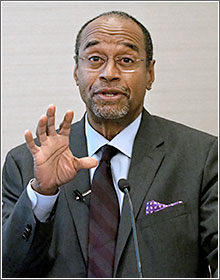Blog Post
Let’s Truly Engage Patients to Drive Health Care Innovation
California Health Care Foundation's founding president Mark Smith calls for shift to "coproduction" of care
Tradition can be a great thing, but we need to re-evaluate how the practices and lessons of the past apply to the present. That was one message stressed by Dr. Mark Smith as he delivered Penn LDI’s Charles C. Leighton, MD Memorial Lecture. Dr. Smith, an internal medicine physician, Wharton School and Penn Robert Wood Johnson Clinical Scholars Program alumnus, and co-chair of the Guiding Committee of the Health Care Payment Learning and Action Network, shared his insights about what patient “engagement” means in the 21st century. His talk contained more than a few pearls of wisdom.

The age of the “traditional” doctor/patient relationship is coming to an end. No longer is the doctor the incontrovertible source of truth and wisdom; rather, shared decision making is becoming the new standard. Providers must engage patients in a different way – not the superficial way that I, as a pediatrician, ask a child if she wants me to look in her right ear or left ear first (hint: it doesn’t matter), or even the more substantive way providers lay out therapy options and help patients make decisions.
The new goal is loftier. As Dr. Smith stated, “if you train the right patients the right way and give them the right equipment, [they] can disintermediate, i.e., eliminate layers of professional activity which are now seen as necessary to provide care.” If that sounds like we’re looking to put ourselves out of business as the middle men (and women) between sick people and their optimal health, you’re right… at least, in part. We should be looking to put ourselves out of our traditional business and move to something new.
It starts with a whole new level of respect for patients – meeting them where they are and assessing how we can help them to help themselves. Dr. Smith shared a quote from Albert Schweitzer, a French-German physician, theologian, and philosopher:
“The witch doctor succeeds for the same reason the rest of us succeed. Each patient carries his own doctor inside him. They come to us not knowing this truth. We are at our best when we give the doctor who resides within each patient a chance to go to work.”
As a pediatrician, I inherently appreciate this. Kids are incredibly resilient. If we set them up for success, they will often do just fine without us dictating every next step. The challenge for the next era of health care, Dr. Smith explained, is to move to truly empowering our patients to join us in a “coproduction” of their care – to be “engaged” does not mean to be compliant with the rules set out by someone else, but to be a part of the process in a more significant way.
As we explore this concept of “coproduction” as a profession, we risk running into the mental trap of “but this is health care, it’s different.” This may be true in some cases, but we must look closely to see if it’s different in a way that matters, or if there’s room for improvement. Dr. Smith pointed out that, when we think about our future needs in health care, we often worry about provider shortages. But we should be thinking about capacity of the system as a whole – including a more independent role for the patient themselves and the contributions of other health professionals – rather than thinking about how many doctors are needed for the work that doctors alone could do 20 years ago.
Dr. Smith pointed out that innovation in other industries could be instructive for health care. For example, if a car rental company wants to reduce the long line of customers waiting to complete a simple transaction, it could add staff to the rental desk. But a more innovative solution would be to allow people to check-in online instead of in person, and assist people at the desk who might actually need it. This is the type of innovation that we need in health care.
We might think “Google, Apple, Amazon — they’re the types of disruptive innovators we need,” and, indeed, we see examples of this already in health care: Apple and Google are embarking down the road of putting patient information in patient hands, and Amazon is partnering with JP Morgan Chase and Berkshire Hathaway to address health care costs for employees. Dr. Smith encouraged all of us to come together to speculate, investigate, troubleshoot, and dream, aiming high to design, implement, and optimize the next generation of health care delivery. Mark Smith exemplifies the long tradition of excellence and leadership here at Penn and within the Clinical Scholars program; that’s one tradition we shouldn’t give up easily.
George Dalembert, MD is a pediatrician and current National Clinician Scholar at Penn.